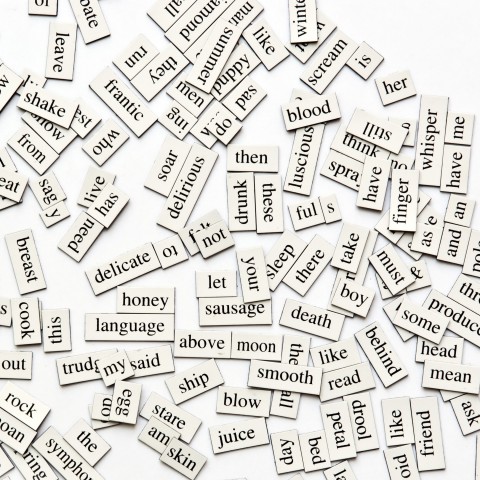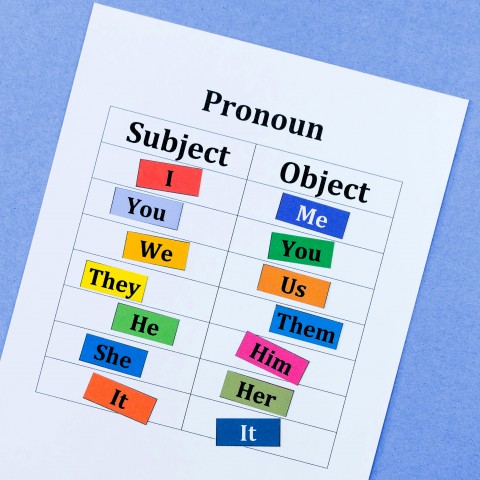
A pronoun is a word used in place of a noun. Everybody knows this definition. But what is a pronoun in Hindi—or rather, what is the meaning of “pronoun” in Hindi?
“Pronoun” in Hindi is known as सर्वनाम (SarvaNaam).Imagine a conversation where you had to repeat the name of a person or thing all the time? Exactly! It would be so dull, so monotonous, and where’s the fun in that? This is where the different kinds of pronouns in Hindi come into play.
 Table of Contents
Table of Contents
- The Importance of a Pronoun in Hindi
- Pronoun Definition and Examples in Hindi
- Types of Pronouns in Hindi
- Hindi Personal Pronouns
- Hindi Demonstrative Pronouns
- Hindi Interrogative Pronouns
- Hindi Indefinite Pronouns
- Hindi Relative Pronouns
- Hindi Distributive Pronouns
- Getting the Best Out of HindiPod101
1. The Importance of a Pronoun in Hindi
The primary purpose of all kinds of pronouns in Hindi is to make the communication clean and clutter-free. Pronouns eliminate redundancy in conversations, at the same time adding more clarity and flow to the talk.
On the other hand, all pronoun words in Hindi play a significant role in enhancing colloquialism in the language. It’s the collection of these pronoun words in Hindi that allows the native language to remain so effortlessly unique and vibrant.

Apart from that, after going through this guide, you’ll also be able to easily differentiate between a noun and pronoun in Hindi. If you haven’t yet, kindly check our super-informative article on “100 Hindi Nouns.”
Talking about nouns, we can’t just skip adjectives, can we? Well, accentuate your communication with these Top 100 Adjectives in Hindi and wow Hindi native speakers with a flawless and smooth Hindi vocabulary!
Now, without further ado, let’s embark on our exciting topic for today.
2. Pronoun Definition and Examples in Hindi
The various parts of speech include, but are not limited to, the: noun, pronoun, adjective, verb, and adverb in Hindi. Needless to say, having at least a surface-level knowledge of each part’s definition and usage can take you a long way toward refining your language skills.
You’ve already learned the meaning of “pronoun” in Hindi, which is सर्वनाम (SarvaNaam). Now it’s time to quickly glance through some examples of Hindi sentences using pronouns.
Let’s make this one easy before heading into more examples. Here’s how you would tell someone what a pronoun is in Hindi:
- संज्ञा के स्थान पर प्रयोग किये जाने वाले शब्द सर्वनाम कहलाते हैं।
Sangyaa ke STHaaN par prayog kiye jaaNe vaaLe sabD SarvaNaam kahaLaaTe hain.
“Words used in place of a noun are called pronouns.”
3. Types of Pronouns in Hindi
There are so many types of pronouns in Hindi. These include:
- “Personal Pronoun” = पुरुषवाचक सर्वनाम (purusavaacak SarvaNaam)
- “Possessive Pronoun” = अधिकारवाचक सर्वनाम (aDHikaaravaacak SarvaNaam)
- “Reflexive Pronoun” = निजवाचक सर्वनाम (Nijavaacak SarvaNaam)
- “Demonstrative Pronoun” = संकेतवाचक सर्वनाम (SankeTavaacak SarvaNaam)
- “Interrogative Pronoun” = प्रश्नवाचक सर्वनाम (prasNavaacak SarvaNaam)
- “Indefinite Pronoun” = अनिश्चयवाचक सर्वनाम (aNiscayavaacak SarvaNaam)
- “Relative Pronoun” = संबंधवाचक सर्वनाम (SambaNDHavaacak SarvaNaam)
- “Distributive Pronoun” = वितरणवाचक सर्वनाम (viTaranavaacak SarvaNaam)
Each kind of pronoun in Hindi will be explained with the help of simple and useful examples.
An interesting and easy way to learn about Hindi language pronouns is to use them abundantly in both spoken and written forms.

To warm up, here are some pronoun examples in Hindi:
- मैं (main) = “I”
- आप (aap) = “You”
- उसको (uSako) = “Him” / “Her”
- कहाँ (kahaan) = “Where”
Let’s see a few pronoun sentences in Hindi using these example words.
- मैं घर जा रही हूँ।
main ghar jaa rahii huun.
“I am going home.”
- आप से मिलकर अच्छा लगा।
aap Se miLakar acchaa Lagaa.
“It was nice meeting you.”
- उसको कल आने के लिए बोल दो।
uSako kaL aaNe ke Liye boL Do.
“Ask him/her to come tomorrow.”
- सुमन कहाँ है?
SumaN kahaan hai?
“Where is Suman?”
By now, you must have gotten a fair idea about what pronouns in Hindi are and how to use them.
In this lesson about pronouns in Hindi, we’ve introduced all the main kinds of pronouns in Hindi.
Are you ready to dig deeper now, and really start learning Hindi pronouns? Let’s go!
4. Hindi Personal Pronouns

The first type of pronoun we’ll be discussing in this Hindi pronouns list is the personal pronoun. Personal pronouns in Hindi are known as पुरुषवाचक सर्वनाम (purusavaacak SarvaNaam). This type of pronoun in Hindi refers to words that replace nouns that are used for a particular person, place, or thing.
To make personal pronouns in Hindi crystal-clear for you, we’ll break it down into sub-categories that are described below.
1- Singular Forms
Almost all Hindi pronouns exercises revolve around the correct use of pronouns in Hindi. This also includes knowing how to form and use the singular and plural forms of pronouns. Let’s go over the concept of the “singular form”, or एकवचन (ekavacaN), of personal pronouns in Hindi.
| Personal Pronouns: Singular Forms | |||
|---|---|---|---|
| Hindi | English | Sentences | |
| 1st Person | मैं (main) | “I” | मैं सोना चाहता हूँ। main SoNaa caahaTaa huun. “I want to sleep.” |
| 2nd Person | तुम (Tum) | “You” | तुम अच्छी लग रही हो। Tum acchii Lag rahii ho. “You look nice.” |
| आप (aap) | “You” | आप चाय लेना पसंद करेंगे? aap caaye LeNaa paSanD karenge. “Would you like to have tea?” | |
| 3rd Person | वह (vah) | “He” | वह रोज़ विद्यालय जाता है। vah roz viDyaaLay jaaTaa hai. “He goes to school every day.” |
| वह (vah) | “She” | वह बहुत उदास थी। vah bahauT uDaaS THii. “She was quite sad.” | |
| यह (yeh) | “It” | यह एक उपन्यास है। yah ek upaNyaaS hai. “It is a novel.” | |
2- Plural Forms
The plural forms are known as बहुवचन (bahuvacaN) in Hindi. Below is a Hindi pronoun chart which showcases some of the most frequently used plural forms of personal pronouns in Hindi.
| Personal Pronouns: Plural Forms | |||
|---|---|---|---|
| Hindi | English | Sentences | |
| 1st Person | हम (ham) Or हम सब (ham Sab) Or हम लोग (ham Log) | “We” | हम सब बाज़ार जा रहे हैं। ham Sab baazaar jaa rahe hain. “We are going to the market.” |
| 2nd Person | तुम सब (Tum Sab) | “You” | तुम सब को हिंदी में चार वाक्य बनाने हैं। Tum Sab ko hinDii men caar vaakya baNaaNe hain. “You have to make four sentences in Hindi.” |
| आप सब (aap Sab) | “You” | आप सब अब जा सकते हैं। aap Sab ab jaa SakaTe hain. “You may go now.” | |
| 3rd Person | वे (ve) | “They” | वे लोग मेरे रिश्तेदार हैं। ve Log mere risTeDaar hain. “They are my relatives.” |
3- Hindi Object Pronouns
This kind of pronoun in Hindi consists of words that are used to replace the object (on which the action is being done) in that sentence. In such sentences, the subject or doer is someone else.

Let’s check out all pronouns in Hindi which are in the object forms.
| Personal Pronouns: Object Forms | |||
|---|---|---|---|
| Hindi | English | Sentences | |
| 1st Person | मुझे (mujhe) | “Me” | शीला मुझे प्यार करती है। siiLaa mujhe pyaar karaTii hai. “Sheila loves me.” |
| हमें (hamen) | “Us” | दादाजी हमें मिठाई दिलाएंगे। DaaDaajii hamen mithaaii DiLaayenge. “Grandpa will buy us sweets.” | |
| 2nd Person | तुम्हें (Tumhen) | “You” | सूरज तुम्हें अपना दोस्त समझता है। Suuraj Tumhen apaNaa DoST SamajhaTaa hai. “Suraj considers you his friend.” |
| आपको (aapako) | “You” | प्रिंसिपल आपको बुला रहे हैं। priNSipaL aapako buLaa rahe hain. “The principal is asking for you.” | |
| 3rd Person | उसे (uSe) | “Him” | राधा उसे फ़ोन नहीं करेगी। raaDHaa uSe foN Nahiin karegii. “Radha will not call him.” |
| उसे (uSe) | “Her” | माँ ने उसे सब्ज़ी लाने भेजा था। maan Ne uSe Sabzii LaaNe bhejaa THaa. “Mother has sent her to buy some vegetables.” | |
| उन्हें (uNhen) | “Them” | पुलिस ने उन्हें रंगे-हाथों पकड़ लिया। puLiS Ne uNhen range-haaTHon pakad Liyaa. “The police caught them red-handed.” | |
4- Casual Forms
No language would be complete without its casual or informal words for chitchats. So, how could we let you miss these hardcore native pronoun words in Hindi?
Here’s our list of Hindi pronouns in their casual forms.
Make sure to use them only with your close friends. Avoid using them with colleagues and those who are older than you as it may leave a bad impression on them!
| Personal Pronouns: Informal / Casual Forms | ||
|---|---|---|
| Hindi | English | Sentences |
| तू (Tuu) | “You” | तू पहले कुछ खा ले। Tuu pahaLe kuch khaa Le. “You eat something first.” |
| तुझे (Tujhe) | “You” | तुझे अब आराम करना चाहिए। Tujhe ab aaraam karaNaa caahiye. “You should get some rest now.” |
| तेरा (Teraa) / तेरी | “Your” | तेरी तबियत कैसी है ? Terii TabiyaT kaiSii hai? “How is your health?” |
5- Possessive Forms
The fifth type of personal pronoun is Hindi possessive pronouns/forms, which in Hindi are called अधिकारवाचक सर्वनाम (aDHikaaravaacak SarvaNaam).As the definition of possessive pronouns in Hindi indicates, the Hindi possessive pronouns are those words which show possession or ownership of a noun.
| Personal Pronouns: Possessive Forms | |||
|---|---|---|---|
| Hindi | English | Sentences | |
| 1st Person | मेरा (meraa) / मेरी (merii) | “My” / “Mine” | मेरा बैग गीला है। meraa baig giiLaa hai. “My bag is wet.” |
| हमारा (hamaaraa) / हमारी (hamaarii) | “Our” | हमारा फ़्रिज ख़राब हो गया है। hamaaraa frij kharaab ho gayaa hai. “Our fridge is not working.” | |
| 2nd Person | तुम्हारा (Tumhaaraa) / तुम्हारी (Tumhaarii) | “Your” | तुम्हारी दवा का वक़्त हो गया। Tumhaarii Davaa kaa vaqT ho gayaa hai. “It’s time for your medicine.” |
| आपका (aapakaa) / आपकी (aapakii) | “Your” | आपका काम हमें बहुत अच्छा लगा। aapakaa kaam hamen bahuT acchaa Lagaa. “We really liked your work.” | |
| 3rd Person | उसका (uSkaa) / उसकी (uSkii) | “His” / “Her” | सीमा अपने परिवार से प्यार करती है और हर सप्ताहांत उनसे मिलने जाती है। Siimaa apNe parivaar Se pyaar karTii hai aur har SapTaahaanT uNSe miLNe jaaTii hai. “Seema loves her family and meets them every weekend.” |
| उनका (uNakaa) / उनकी (uNakii) | “Their” | मुझे उनका फ़ोन नंबर मालूम है। mujhe uNakaa foN Nambar maaLuum hai. “I know their phone numbers.” | |
Now that you’re familiar with Hindi possessive pronouns, it’s time to study another significant sub-topic: the reflexive pronoun in Hindi.
6- Reflexive Forms
Before we look at the Hindi pronouns table below, we’ll first go over the meaning of reflexive pronouns in Hindi.

The reflexive forms, or emphatic pronouns, are known as निजवाचक सर्वनाम (Nijavaacak SarvaNaam). While there are several words that qualify as reflexive pronouns in English, they’re reduced to two common phrases in Hindi that are used for all first-, second-, and third-person personal pronouns.
Which ones are these? Find out for yourself!
| Personal Pronouns: Reflexive Forms | ||
|---|---|---|
| Hindi | English | Sentences |
| “Myself” | मैं ख़ुद वहाँ जाना चाहती हूँ। main khuD vahaan jaaNaa caahaTii huun. “I want to go there myself.” |
| “Yourself” | तुम ख़ुद ये नौकरी करना चाहते थे। Tum khuD hii ye Naukarii karaNaa caahaTe THe. “You yourself wanted this job.” | |
| “Themselves” | उन्होंने ख़ुद ही सामान का भुगतान किया था। uNhoNe khuD hii SaamaaN kaa bhugaTaaN kiyaa THaa. “They, themselves, paid for the stuff.” | |
| “Himself” | बच्चा अपने आप ही चलने लगा। baccaa apaNe aap hi caLaNe Lagaa. “The toddler himself started walking.” | |
| “Herself” | इसके लिए सीमा ख़ुद ज़िम्मेदार है। iSake Liye Siimaa khuD zimmeDaar hai. “Seema herself is responsible for this.” | |
| “Ourselves” | हम ख़ुद इस मुश्किल में पड़ गए। ham khuD iS muskiL men pad gaye. “We got into this problem ourselves.” | |
As you can see, we have just two Hindi phrases for so many English reflexive pronouns. Actually, both the phrases अपने-आप (apaNe-aap) and ख़ुद-ही (khuD-hii) can be used to replace any of the English reflexive pronouns, be it “himself,” “herself,” “themselves,” and so on.
Hence, regardless of the English reflexive pronouns, the clarity of the context mostly depends on the Hindi personal pronouns in that sentence, and not on the Hindi reflexive pronouns.
5. Hindi Demonstrative Pronouns
Now, we’ll talk about the demonstrative pronoun in Hindi. These pronouns are quite important, and we’ll look at them in more depth in the following Hindi pronouns chart.

The demonstrative pronoun meaning in Hindi is संकेतवाचक सर्वनाम (SankeTavaacak SarvaNaam). It’s also known as a definite pronoun in Hindi, or निश्चयवाचक सर्वनाम (Niscayavaacak SarvaNaam).
These are words which indicate a specific noun.
| Demonstrative Pronouns | ||
|---|---|---|
| Hindi | English | Sentences |
| यह (yeh) | “This” | यह चादर मुझे तोहफ़े में मिली थी। yah caaDar mujhe Tohafe men miLii THii. “I got this bedsheet as a present.” |
| ह (vah) | “That” | वह लड़का बीमार है। vah Ladakaa biimaar hai. “That boy is sick.” |
| ये (ye) | “These” | ये मकान बहुत पुराने हैं। ye makaaN bahuT puraaNe hain. “These houses are quite old.” |
| वे (ve) | “Those” | वे किताबें साधना की हैं। ve kiTaaben SaaDHaNaa kii hain. “Those are Sadhana’s books.” |
| यहाँ (yahaan) | “Here” | तुम यहाँ कैसे आये ? Tum yahaan kaiSe aaye? “How did you get here?” |
| वहाँ (vahaan) | “There” | जाओ और वहाँ सोफ़े पर बैठ जाओ। jaao aur vahaan Sofe par baith jaao. “Go and sit on the sofa there.” |
| ऐसा / ऐसी (aiSaa / aiSii) | “Such” | मुझे ऐसी फ़िल्में पसंद नहीं हैं। mujhe aiSii fiLmen paSanD Nahiin hain. “I don’t like such movies.” |
| वही | “The same” | ये वही बच्ची है जिसके बारे में मैंने तुम्हें बताया था। ye vahii baccii hai jiSake baare men maine Tumhen baTaayaa THaa. “It’s the same girl I told you about.” |
6. Hindi Interrogative Pronouns

Interrogative pronouns in Hindi help us ask questions about any noun. In Hindi, these are known as प्रश्नवाचक सर्वनाम (prasNavaacak SarvaNaam).
| Interrogative Pronouns | ||
|---|---|---|
| Hindi | English | Sentences |
| क्या (kyaa) | “What” | तुम दोपहर में क्या खाओगे ? Tum Dopahar men kyaa khaaoge? “What will you have for lunch?” |
| क्यों (kyon) | “Why” | अर्जुन क्यों रो रहा है ? arjuN kyon ro rahaa hai? “Why is Arjun crying?” |
| कौन सा (kauN Saa) / सी (Sii) | “Which” | उसको कौन सा रंग पसंद है? uSako kauN Saa rang paSanD hai? “Which is her favorite color?” |
| कौन (kauN) | “Who” | दरवाज़े पर कौन था ? Darvaaze par kauN THaa? “Who was on the door?” |
| किसे (kiSe) / किसको (kiSako) | “Whom” | तुम किसे ज़्यादा प्यार करते हो ? Tum kiSe zyaaDaa pyaar karaTe ho? “Whom do you love more?” |
| किसका (kiSkaa) / किसकी (kiSkii) | “Whose” | यह कलम किसकी है ? yah kaLam kiSakii hai? “Whose pen is this?” |
| कहाँ (kahaan) / किधर (kiDHar) | “Where” | बाक़ी लोग कहाँ हैं ? baaqii Log kahaan hain? “Where is everybody else?” |
| कब (kab) | “When” | बस कब आएगी ? baS kab aayegii? “When will the bus be here?” |
7. Hindi Indefinite Pronouns
The next sub-topic in our Hindi pronouns list is the indefinite pronoun. Indefinite pronouns in Hindi are called अनिश्चयवाचक सर्वनाम (aNiscayavaacak SarvaNaam).
These pronoun words are useful when we’re referring to a noun, but not something in particular.
| Indefinite Pronouns | ||
|---|---|---|
| Hindi | English | Sentences |
| कुछ (kuch) / थोड़ा (THodaa) | “Some” / “Few” | मुझे कुछ वक़्त चाहिए। mujhe kuch vaqT caahiye. “I need some time.” |
| कोई (koii) | “Any” | उसके पास कोई और ड्रेस नहीं है। uSake paaS koii aur dreS Nahiin hai. “She doesn’t have any other dress.” |
| सभी (Sabhii) / सारे (Saare) | “All” | मेरे भतीजे को सारे गुब्बारे चाहिए थे। mere bhaTiije ko Saare gubbaare caahiye THe. “My nephew wanted all the balloons.” |
| कई (kaii) | “Many” | रवि को उसके जन्मदिन पर कई तोहफ़े मिले। ravi ko uSake jaNmaDiN par kaii Tohafe miLe. “Ravi got so many presents on his birthday.” |
| हर कोई (har koii) | “Everybody” | हर कोई ख़ुश रहना चाहता है। har koii khus rahaNaa caahaTaa hai. “Everybody wants to be happy.” |
| हर किसी (har kiSii) | “Everyone” | हर किसी ने उसके गाने की तारीफ़ की। har kiSii Ne uSake gaaNe kii Taariif kii. “Everyone praised her singing.” |
| सब जगह (Sab jagah) Or हर तरफ़ (har Taraf) | “Everywhere” | आजकल सब जगह प्रदूषण बढ़ रहा है। aaj kaL Sab jagah praDuusan badh rahaa hai. “Nowadays, the pollution levels are rising everywhere.” |
| कोई (koii) | “Someone” / “Somebody” | बाहर कोई तुम्हारा इंतज़ार कर रहा है। baahar koii Tumhaaraa inTazaar kar rahaa hai. “Someone is waiting for you outside.” |
| किसी ने (kiSii Ne) | “Somebody” | क्या किसी ने तुम्हें कुछ कहा ? kyaa kiSii Ne Tumhen kuch kahaa? “Did somebody say something to you?” |
| किसी को (kiSii ko) | “Someone” | चलो, किसी को रात के खाने पर बुलाते हैं। caLo, kiSii ko raaT ke khaaNe par buLaaTe hain. “Come on, let’s invite someone for dinner.” |
| किसी का (kiSii kaa) | “Someone’s” | हॉल में किसी का सूटकेस रखा है। haauL men kiSii kaa Suut keS rakhaa hai. “Someone’s suitcase is there in the hall.” |
| कहीं (kahiin) | “Somewhere” | कविता आज कहीं जाने का प्लान बना रही थी। kaviTaa aaj kahiin jaaNe kaa pLaaN baNaa rahii THii. “Kavita was planning to go somewhere today.” |
| कुछ (kuch) | “Something” | कहीं तुम कुछ भूल तो नहीं रहे ? kahiin Tum kuch bhuuL To Nahiin rahe? “Aren’t you forgetting something?” |
| सब कुछ (Sab kuch) | “Everything” | मैं सब कुछ जानना चाहता हूँ। main Sab kuch jaaNaNaa caahaTaa huun. “I want to know everything.” |
| कोई नहीं (koii Nahiin) | “No-one” / “Nobody” | यहाँ पर तो कोई नहीं है। yahaan par To koii Nahiin hai. “There’s no-one here.” |
| कुछ नहीं (kuch Nahiin) | “Nothing” | एक्सीडेंट भयानक था लेकिन मुझे कुछ नहीं हुआ। ekSiident bhayaaNak THaa LekiN mujhe kuch Nahiin huaa. “It was a terrible accident, but nothing happened to me.” |
| कहीं नहीं (kahiin Nahiin) | “Nowhere” | आइसक्रीम बेचने वाला कहीं नहीं दिख रहा था। aaiS kriim becNe vaaLaa kahiin Nahiin Dikh rahaa THaa. “The ice-cream vendor was nowhere in sight.” |
| कोई भी (koii bhii) | “Anyone” / “Anybody” | कोई भी इस प्रतियोगिता में भाग ले सकता है। koii bhii iS praTiyogiTaa men bhaag Le SakaTaa hai. “Anyone can participate in this competition.” |
| किसी को भी (kiSii ko bhii) | “Anyone” | पूजा ने किसी को भी ये बात नहीं बताई। puujaa Ne kiSii ko bhii ye baaT Nahiin baTaayii. “Pooja didn’t tell anyone about it.” |
| जिस किसी को भी (jiS kiSii ko bhii) | “Whomever” | तुम जिस किसी को भी चाहो उसे घर पर बुला सकती हो। Tum jiS kiSii ko bhii caaho uSe ghar par buLaa SakaTii ho. “You can invite whomever you like.” |
| जो कोई भी (jo koii bhii) | “Whoever” | जो कोई भी पहले उस लाइन को पार करेगा विजेता बनेगा। jo koii bhii pahaLe uS LaaiN ko paar karegaa vijeTaa baNegaa. “Whoever touches that line first is the winner.” |
| कहीं भी (kahiin bhii) | “Anywhere” | तुम कहीं भी मत जाना। Tum kahiin bhii maT jaaNaa. “Don’t go anywhere.” |
| कुछ भी (kuch bhii) | “Anything” | मैं कुछ भी नहीं सुनना चाहती। main kuch bhii Nahiin SuNaNaa caahaTii. “I don’t want to hear anything.” |

8. Hindi Relative Pronouns
We’ve covered nearly all the different types of pronouns in Hindi. But let us remind you of another really significant one: the relative pronoun in Hindi.Relative pronouns in Hindi are called संबंधवाचक सर्वनाम (SambaNDHavaacak SarvaNaam). They show the relationship or connection that helps describe the noun that’s being talked about.
| Relative Pronouns | ||
|---|---|---|
| Hindi | English | Sentences |
| जो (jo) | “That” | वो किताब कहाँ रखी है जो आप ने कल ख़रीदी थी? vo kiTaab kahaan rakhii hai jo aap Ne kaL khariiDii THii? “Where is that book you bought yesterday?” |
| जो (jo) | “Which” | श्याम ने पार्टी में जो शर्ट पहनी थी वो काफ़ी सुंदर थी। syaam Ne paartii men jo sart pahaNii THii vo kaafii SuNDar THii. “The shirt which Shyam was wearing at the party was quite nice.” |
| जो (jo) | “Who” | जो लड़का मुझसे मिलने आया था वह मेरा सहपाठी है। jo Ladakaa mujh Se miLaNe aayaa THaa vah meraa Sahapaathii hai. “The boy who came to meet me is my classmate.” |
| जिसने (jiSaNe) | “Who” | ये वही लड़की है जिसने कल मेरी मदद की थी। ye vahii Ladakii hai jiSaNe kaL merii maDaD kii THii. “This is the girl who helped me yesterday.” |
| जिसे (jiSe) Or जिसको (jiSko) | “Whom” | मैं जिसे पसंद करता था वह प्रत्याशी चुनाव में जीत गया है। main jiSe paSanD karTaa THaa vah praTyaasiii cuNaav men jiiT gayaa hai. “The candidate who* I was supporting has won the election.” (*Quick Note: Please, note that the English translation isn’t exactly the same as the Hindi, so the Hindi “whom” became “who”.) |
| जिसका (jiSakaa) | “Whose” | यह जिसका पर्स है उसी को लौटा देते हैं। yah jiSakaa parS hai uSii ko Lautaa DeTe hain. “Let’s return this to the person whose purse this is.” |
| जहाँ (jahaan) / जिधर (jiDHar) | “Where” | वहीं चलो जहाँ कल खाना खाया था। vahiin caLo jahaan kaL khaaNaa khaayaa THaa. “Let’s go to the same place where we ate yesterday.” |
| जब (jab) | “When” | जब तुम सो रहे थे मैं काम कर रहा था। jab Tum So rahe THe main kaam kar rahaa THaa. “I was working when you were sleeping.” |
9. Hindi Distributive Pronouns
Our last type of pronoun is the distributive pronoun. In Hindi, the distributive pronoun is known as वितरणवाचक सर्वनाम (viTaranavaacak SarvaNaam).
Let’s look at the chart below and find out which Hindi pronouns qualify as the distributive pronouns.
| Distributive Pronouns | ||
|---|---|---|
| Hindi | English | Sentences |
| हर एक (har ek) / प्रत्येक (praTyek) | “Each” | प्रत्येक खिलाड़ी को एक नयी टी-शर्ट मिलेगी। praTyek khiLaadii ko ek Nayii tii-sart miLegii. “Each player will get a new t-shirt.” |
| या तो (yaa To) / या फिर (ya phir) | “Either-or” | या तो तुम हिंदी पढ़ सकती हो या फिर फ़्रेंच। yaa To Tum hiNDii padh SakaTii ho yaa phir freNc. “You can either study Hindi or French.” |
| ना तो (Naa To) | “Neither-nor” | मेरी बीमारी के वक़्त न तो मेरी माँ पास थी न ही मेरे पिता। merii biimaarii ke vaqT Na To merii maan paaS THii Na hii mere piTaa. “Neither my mother nor father were around when I was sick.” |
| कोई नहीं (koii Nahiin) | “None” | सभी कमरों में कोई साफ़ नहीं था। Sabhii kamaron men koii Saaf Nahiin THaa. “None of the rooms were clean.” |
10. Getting the Best Out of HindiPod101

To get the most out of what you read today, you can treat this whole pronoun list in Hindi as an awesome Hindi pronoun exercise. Just pick one word and try making different sentences with it.
With this, we come to the end of this comprehensive guide on pronouns in Hindi. But we have so much more to offer.
You can join us by signing up on HindiPod101.com. By doing that, you’ll be able to access all the top-class Hindi learning resources, including our free Hindi-English dictionary.
If you’re on the go most of the time, worry not. Our user-friendly mobile app is easy to download and helps you learn anywhere, anytime, as per your convenience.
So, what are you waiting for? Explore a unique and informative world of Hindi learning and take your first step toward talking like a native!
And before you go, be sure to let us know in the comments how you feel about pronouns in Hindi now! Is there anything you still have questions about? We look forward to hearing from you!










